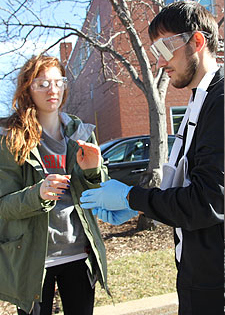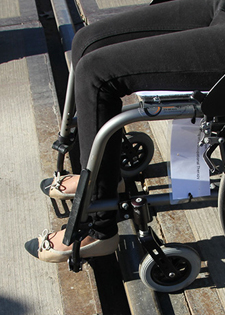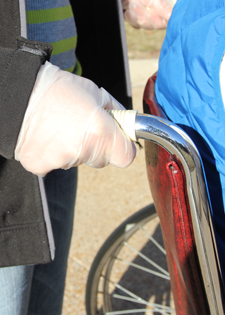Rehabilitation and Participation Science
Program in Occupational Therapy
 Jessica Dashner, OTD, OTR/L, who teaches the Environmental Factors Facilitating Performance and Participation class for the Program in Occupational Therapy, starts the Spring semester with a hands-on assignment designed to give first-year students an idea of what daily barriers a client with a disability may face.
Jessica Dashner, OTD, OTR/L, who teaches the Environmental Factors Facilitating Performance and Participation class for the Program in Occupational Therapy, starts the Spring semester with a hands-on assignment designed to give first-year students an idea of what daily barriers a client with a disability may face.
Students were divided into small groups of six and were given four cases and the equipment to simulate conditions such as macular degeneration, hearing loss, mobility and sensory deficit (pictured right, Megan Moauro, MSOT/S '15, and Cody Nordhues. MSOT/S '15, wearing the equipment). Two students served as safety monitors to assist the groups in traveling to a specific area on campus to complete a common, everyday task.
“This experience is a valuable one, but it can be somewhat controversial in the disability community. I stress to the students that we are not trying to show them what it is like to have a disability, but rather to experience what the environmental barriers and facilitators are,” Dashner says. “It helps students understand the challenges a client may have by personally experiencing them.”
Originally developed by Susy Stark, PhD, OTR/L, FAOTA, Dashner has taught the Environmental Factors Facilitating Performance and Participation class for three years. After the activities are completed, the class engages in a discussion about the facilitators and barriers they faced during the simulation.
 “I really became aware of which entrances did not have automatic doors and how the slightest slope, which appears to be level, is not to someone in a wheelchair,” Kelly Taylor, OTD/S ’16, observed. “Elevators don’t always allow enough time for someone to press a button, turn around, get in, turn around again and press the floor button especially if they aren’t the only one in the elevator.“
“I really became aware of which entrances did not have automatic doors and how the slightest slope, which appears to be level, is not to someone in a wheelchair,” Kelly Taylor, OTD/S ’16, observed. “Elevators don’t always allow enough time for someone to press a button, turn around, get in, turn around again and press the floor button especially if they aren’t the only one in the elevator.“
Students experiencing sensory deficits became aware of how signage, reading a computer screen, finding a building or even paying for a coffee can be a challenge.
“A person with a sensory deficit may have difficulty getting money out of a purse or wallet and someone with a vision deficit may have difficulty even telling what denomination the bills are. It can be a very frustrating experience for them,” Dashner explains. “A possible solution would be to make currency different sizes or have braille marking to give people a tactile cue to help distinguish between a five dollar bill and a twenty dollar bill.”
One group decided to have the student experiencing vision loss push the student in the wheelchair across sidewalks and streets as it is common for a caregiver to also have impairments.
“It was difficult to push the wheelchair and see the curbs and poles,” Jordon Lauffer, MSOT/S ’15, commented. “I was glad we had safety monitors during our experience but in the real world, an elderly couple in this same situation would not.”
 During the Summer semester, students have the opportunity to participate in group service learning projects with a variety of community partners. Each year, one of the groups works with representatives from the ADA Committee on the Washington University School of Medicine campus to offer assistance or advice with concerns they have about the accessibility on the campus.
During the Summer semester, students have the opportunity to participate in group service learning projects with a variety of community partners. Each year, one of the groups works with representatives from the ADA Committee on the Washington University School of Medicine campus to offer assistance or advice with concerns they have about the accessibility on the campus.
“Last year’s group was asked to assist with rerouting pedestrian traffic around some of the construction sites to make sure everyone with or without a disability can safely get to where they need to be. The students made a presentation and submitted a report to the committee to share their findings,” Dashner says. “I am glad our Program and our students can have the opportunity to help make our campus, and our community, an accessible and usable place for all.”
We welcome inquiries from prospective students, potential collaborators, community partners, alumni and others who want to connect with us. Please complete the form below to begin the conversation.
Schedule an Info Session
We are excited that you are considering applying to the Program in Occupational Therapy at Washington University. Please join us for a Zoom Information Session for either our entry-level MSOT or OTD degrees or our online Post-Professional OTD. Current faculty members will discuss the degree program and answer any question you may have. We are offering these sessions on the following days and times. The content is the same for each one, so you only need to sign up for one.
Upcoming ENTRY-LEVEL Degree ZOOM Info sessions:
Schedule an Entry-Level Info Session
Upcoming PP-OTD Degree ZOOM Info session: